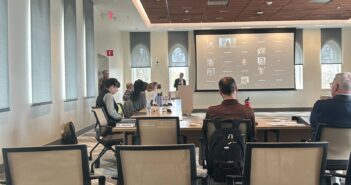It wasn’t long ago, in simpler times, when the College of Health was Lehigh’s big dream — the framework of which was carved out by President John Simon and then-Provost Pat Farrell and given the board of trustees’ stamp of approval.
The College of Health is one of the leading projects of Go: The Campaign for Lehigh, a $1 billion initiative kickstarted by the university in 2016. The campaign phrases the college as “a novel, nonclinical college that will take full advantage of Lehigh’s strengths in interdisciplinary and entrepreneurial approaches to research and education.”
While the College of Health opened this past August, the new Health, Science and Technology building, which will house the college, is still under construction at the corner of Morton and Webster streets. The $145 million project did not appear to face major setbacks due to the pandemic and is on track to open in August 2021.
Provost Nathan Urban boasted the college’s successes, despite challenging circumstances.
“The College of Health is really off to a strong start,” he said. “It has a good class of students –– overenrolled, the target was about 50 and we are enrolling about 60 students –– we have been able to hire seven really strong faculty into the college, but overall there’s a lot that has happened in a very short time. There was a lot of progress that was made.”
As it currently stands, Lehigh is reporting there are 63 students enrolled in the College of Health. The college employs six full-time faculty members, aside from Halcyon Skinner, the associate dean of the college, and Beth Dolan. Dolan serves as the college’s interim dean following Whitney Witt’s recent resignation as dean of the College of Health last week.
The college is aiming to employ 60 faculty members by 2024 — an increase of 10 times the current size of the faculty — and enroll 750 students by that same year. That means the college makes up a majority of Lehigh’s larger Path to Prominence expansion goals, which in part includes a growth of the student body by 1,000 undergraduate students and the hiring of 100 new faculty members across the university over the course of this decade.
The Path to Prominence has already reshaped campus, producing a renovated Chandler-Ullmann, Mountaintop Building C and Fairchild-Martindale Library as well as the soon-to-open Singleton, Hitch and Maida residences.
But as the university implements its hiring freeze due to fiscal constraints brought by the coronavirus pandemic, the College of Health — and the university at large — faces challenges in meeting its ambitious targets.
Still, as proof of just how important the College of Health is to Lehigh’s growth strategy, the college is advertising eight open faculty positions. That accounts for almost half of the 18 positions open across Lehigh, according to Amy White, the associate director in media relations. Those positions required special approval during the hiring freeze, White said, and the 18 open positions in the first quarter of this fiscal year are a dramatic drop from the 76 open positions during that quarter one year ago.
“The College of Health is younger and therefore in a more growth-driven stage than our other colleges,” White said in an email. “Right now the College of Health only has first-year students. If we simply recruit as many students this year as last, the student population in the College of Health will double, creating a clear need for new faculty to be hired.”
White said not every position may be filled “if financial conditions do not improve.” She added the eight open positions in the College of Health are still “significantly fewer” than what was originally planned before the hiring freeze.
Sean Daley, a professor of practice in the College of Health, said he’s concerned about how the current atmosphere in the college will impact the effectiveness of the planned growth. Before Witt’s resignation on Dec. 18, three College of Health faculty members spoke to The Brown and White about concerns they had about the college’s culture and say they have spoken to higher administrators, like Provost Nathan Urban, about those concerns.
“Right now we’re trying to hire multiple new faculty members to come in, (and) there’s this chasm, and whether they want to or not, they’re going to end up on one side of the chasm,” Sean Daley said in a November interview. “And it’s only going to get bigger, and that’s the last thing we need is more people picking a side and the College of Health becoming more divided.”
Additionally, Fathima Wakeel, an associate professor in the College of Health, Sherry Buss, the director of administration in the college, and Heather Messina, a grant specialist in the college, spoke to The Brown and White about the college’s opening more broadly but declined to comment about the specific concerns levied against Witt. The other two faculty members and two staff members in the college did not return requests for comment.
The pandemic has brought other concerns for some of the college’s faculty members — inside the classroom.
One of the academic topics most important to Christine Daley, a professor in the College of Health, is the coronavirus. Christine and Sean Daley are married.
“I teach about it, it’s a big part of what I do,” she said. “One of the things I’m really frustrated with is we are opening a College of Health — health! — during the first infectious pandemic in 100 years. But we are opening in the middle of this really historic time period and I don’t see the College of Health taking a lead in handling this for the Lehigh community.”
She said she feels the college has a responsibility to reach out to the student body, both locally and internationally, as students are spread out around the world. Christine Daley said she tried to voice her frustration with the college’s administration and pitched multiple pandemic related elective courses as ways to better educate the student body on current issues.
“I don’t get why that’s not happening,” she said in an interview prior to Witt’s resignation. “It’s a real frustration of mine.”
Christine Daley said she proposed a course on pandemics throughout human evolution, but said she was told by Witt that a course of that nature was “simply not needed right now.”
“I just don’t know when else they’re needed,” she said. “So when you bring things up like that and then they’re shut down, it’s a little frustrating. So I’ve been a little reticent to bring up more ideas like that.”
In terms of the college’s core academic offerings, the College of Health currently has one major in population health. A recent $5 million donation by a board of trustee member will fund a chair for a new department of health innovation and technology. Graduate degree programs are also set to launch in 2021.
Despite a tumultuous first year, the College of Health faculty and staff members who spoke to The Brown and White for this story — including Christine and Sean Daley and a College of Health faculty member who wished to remain anonymous for fear of retaliation, who each shared concerns specific to Witt — remain optimistic about Lehigh and the potential for positive change.
“The first semester in the College of Health has really been exciting,” Wakeel said. “It’s been such an honor to work with these amazing students. I’ve been so pleased and humbled — it’s been great. I saw that students were very resilient, despite the fact we’ve had to operate in a virtual environment.”
Wakeel said the college and university as a whole has been supportive of her research endeavors thus far and believes a population health degree is more attractive than ever as COVID-19 has laid bare the impacts of health determinants on health outcomes. And she described the college’s faculty as “united,” “collegial” and full of “great ideas” in terms of creating a vision for the college as it looks to grow substantially.
Buss echoed many of Wakeel’s thoughts, referring to this past fall semester as a “very positive experience” despite the challenges associated with managing a virtual environment. She said the pandemic has created particular obstacles around faculty hirings, efforts which remain ongoing despite the inability for candidates to visit campus for face-to-face interactions.
Sean Daley highlighted mentoring relationships he has been able to form with students that were more challenging to create at his previous, two-year college.
He said his choice to start at Lehigh was motivated by “a multitude of reasons” and his optimism is fueled by seeing his colleagues receive grants and publish research papers of their own.
“I have to be optimistic,” Sean Daley said. “If I wasn’t optimistic I’d have to leave, and I’m not ready to leave Lehigh. If we’re seeing this same situation a year from now, maybe that optimism is going to wane.”
The anonymous College of Health faculty member expressed similar levels of trust in the system. The source was confident prior to Witt’s resignation that the concerns that had been raised to administrators would get addressed — and the source had an idea of what “getting better” could look like for the college moving forward.
“I think the measure is if they notice a mistake or a problem, that they can handle it. And I am optimistic that they will,” the source said prior to Witt’s resignation. “I think getting better means being able to ask questions, being given more autonomy, being supported and allowed to make mistakes. I think for me that would mean getting better, those sorts of things. Things that you would expect as a student taking class. I think those are the things that would mean getting better.”
Derailed by a global pandemic and with tens of millions already invested in the ability of the College of Health to attract hundreds of new students and dozens of new faculty, it’s all coming to a head as the college plans to double in size next year amid mounting dissatisfaction among some of the college’s current faculty.
The college is now faced with managing multiple major tasks: recruiting new students, hiring new faculty members against a squeezed budget and, perhaps more surprisingly, keeping its current six faculty members satisfied in their new roles while finding a new permanent dean.
“The amount of support we’re getting (from the overall university) to do what we need to do is amazing,” Sean Daley said. “It is truly amazing. I wish I could say we got that same level of support from my own college.”
This report was compiled by The Brown and White’s Investigative Team.







Comment policy
Comments posted to The Brown and White website are reviewed by a moderator before being approved. Incendiary speech or harassing language, including comments targeted at individuals, may be deemed unacceptable and not published. Spam and other soliciting will also be declined.
The Brown and White also reserves the right to not publish entirely anonymous comments.
3 Comments
So exactly what is the “chasm” that exists within the College? A lot of generalized description of dissension, which probably explains Witt’s departure but, what has been the crux of the dispute?
Agree on need for specifics describing both sides. It seems the path forward requires many major decisions – what are they and which side wants what?
I just read this article and found it amazing. I hope i will see more contents like the one in future.